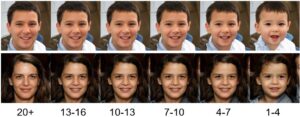
Biometric systems, and especially facial recognition systems, have become ubiquitous in our daily lives, serving as a reliable means of authentication for personal devices. Recently, deep learning has significantly improved the performance of facial recognition technology, although these approaches are dependent on the quality and quantity of the data used for training. As such, the verification performance of these systems on children is reported as subpar as there exists no large-scale unbiased database of children’s faces, due to privacy concerns. However, automatic recognition of children from faces has numerous applications, including the potential to find missing or kidnapped children or analyze child sexual abuse material.
Therefore, this thesis aims to address the need for a database of children’s faces by using generative adversarial networks (GANs) and face age progression (FAP) models to synthesize a realistic dataset. To generate high-quality adult and corresponding child faces, the thesis performs an evaluation of various state-of-the-art FAP methods, considering several criteria, including the preservation of subject identity across ages. The final solution involves a software pipeline consisting of multiple steps and models. The pipeline initially utilizes StyleGAN3 to sample adult subjects, which are subsequently progressed to children of varying ages using InterFaceGAN, enabling direct manipulation of subjects in the StyleGAN3 latent space. Intra-subject variations, such as facial expression and pose, are created by also manipulating the subjects in their latent space. Additionally, the pipeline allows to evenly distribute the races of subjects, allowing to generate a balanced and fair dataset with respect to race distribution.
Using the pipeline, a database was created, consisting of 1652 subjects and a total of 188,832 images. The significant number of images is due to each subject being present at various ages and with many different intra-subject variations. The thesis evaluates the performance of various facial recognition systems on the synthetic database and compares the results of adults and children at different ages. The study reveals that children consistently perform worse than adults, on all systems tested, and the degradation in performance is proportional to age. Additionally, the study uncovers some biases in the recognition systems, with Asian and Black subjects and females performing worse than White and Latino Hispanic subjects and males.
Overall, this thesis provides valuable insights into the performance of facial recognition systems on children and highlights the need for unbiased, diverse data sets to train these systems. The synthetic database created through this work can serve as a valuable resource for researchers and practitioners in the field.
